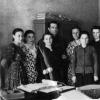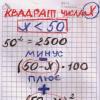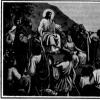Is it necessary to read the canons and the Follow-up before communion of the Holy Mysteries of Christ? Rule for reading prayer canons
Asked by: Stefan
Moscow, Orthodoxy
Hello father! I have this question. There are three canons that are read before confession. In various sources I have seen that you need to read the prayer canon to the Most Holy Theotokos, and the other one for repentance. Which one is correct, so as not to sin? And what are the rules for reading canons and prayers at home, is prayer allowed while sitting, etc.? Let’s say, if after standing for a long time you begin to be distracted more by the standing itself than by prayer...
I would also like to know whether it is permissible to use recordings of prayers performed by priests and others during home prayer, reading canons, akathists, etc., which are now produced in large quantities, while praying mentally repeating after the person praying in the recording?
Answers: Hegumen Daniil (Gridchenko)
Stepan! Confession itself does not require special prayer preparation. A special prayer rule is read on the eve of communion. In fact, it usually, in addition to the immediate “Following to Holy Communion,” includes three canons - the Savior, the Mother of God, and the Guardian Angel. Which canon to read - prayer or penitential - is a matter of your choice. I think it makes sense to pray with those words that have greater meaning for you today, that are more likely to touch your soul, and that correspond to your mood.
In general, a certain kind of freedom is assumed in choosing a prayer rule. It cannot be the same for everyone. Obviously, the time and energy devoted to prayer by a monk and a person burdened with family and work are not the same thing. People who come to Church differ from each other in age, occupation, degree of church affiliation... However, the apostolic commandment is pray without ceasing(1 Thess. 5:17), applies to everyone. And no matter how inconvenient it may seem, in any case, it indicates a vector, a direction towards which the spiritual life of every person who considers himself a Christian should be built. God is Spirit - without prayer, without a living connection with your Creator and Lord, spiritual life cannot exist in principle... There is no need to delude yourself: what they sometimes call it in a secular environment is, at best, the spiritual disposition of a well-intentioned individual...
You can pray standing, sitting, lying down, on the way, while waiting, out loud, mentally to yourself…. The main thing is that prayer should not be a mechanical reading of texts, but should be coupled with a feeling of reverence. It is no coincidence that in Orthodox churches people stand before God... However, the opinion that it is sometimes better to sit and think about God than to stand about your feet also has a right to exist... It is therefore important, when choosing a prayer rule, not to impose unbearable burdens on yourself. For often a rule taken beyond one’s strength ends in the abandonment of all prayer altogether…. The work of prayer, like any good deed, requires gradualness and prudence in its improvement.
There is a lot to be said about prayer. Unfortunately, the format of our communication does not imply this. But there are holy fathers who dedicated their lives to prayer and left behind volumes of ascetic literature. To get acquainted with it in modern times is not so difficult - if only you had the desire... It's good if it comes true. However, I must warn you: a serious attitude to prayer without striving to live according to the Gospel commandments, without struggling with one’s sinful passions, can be dangerous and lead to spiritual catastrophe. Be carefull….
Also, for convenience, we suggest using the ability to select the subsection you are interested in (when publishing a question in the “Category” column, you must select the subsection you are interested in).
Select answer:
All answers from priests Joseph (Korolyov), Hieromonk Lazar (Antipenko), Hieromonk Roman (Kropotov), Hieromonk Photius (Mochalov), Hieromonk
Question (Larissa) March 14, 2013 Father Roman! I have one more question. Thank you in advance. Is it possible to read psalms at the workplace, sitting or in transport? If you have time, you don’t want to waste it just like that. I would like to know more about the difference between a canon and an akathist; is it possible to read the canons to saints during Lent? What spiritual difference is there between the early and late liturgy?
A canon is a type of liturgical hymn consisting of 9 songs. An akathist is also a hymn, but predominantly of laudatory content. Unlike the canon, which, having replaced the kontakia, has become an integral part of the divine service, the akathist is not so popular in liturgical practice. The Charter mentions only the Great Akathist, read on Saturday of the 5th week of Lent.
The early and late Liturgies have no difference in spiritual terms. They exist only because of the convenience of the parishioners - some find it more convenient early, others later.
Question (Olga) March 14, 2013 Hello, Father Roman! Is it possible to read akathists during Lent if I took a blessing to read the akathist to the Mother of God “Unexpected Joy” and read it every Sunday at 20.30?
Answer (Roman (Kropotov), hieromonk) Such issues are decided by the confessor individually. From whom you were blessed, you need to ask. This is ethics. From the outside I can say that with blessing it is possible (at home).
Question (Photinia) March 14, 2013 Good afternoon, Father Roman! Sorry if something is wrong. Would you like to know what is read in the prayer book for strict fasting before Great Easter? And today I’ve been calling all day: Is there an appointment with Father Vlasiy now? Sorry again if anything is wrong.
Answer (Roman (Kropotov), hieromonk)
It’s not entirely clear what it means – before Easter? If you ask what is read during Great Lent, then everything is the same - prayers from the prayer book (morning, evening, everyday, etc.), canons, psalter, on Saturdays and Sundays you can have akathists. If you meant what to read before communion on Easter, then everything is the same as on an ordinary day. On Bright Week, preparation for communion consists of Easter hours, the Easter canon and prayers for Holy Communion.
The reception is underway.
Be healthy.
Question (Larissa) March 13, 2013 Hello, Father Roman! Is it allowed to read prayer canons during Lent? Can a lay person read the prayer canon to the Holy Trinity? I read the instructions of Seraphim of Sarov, in which he says that a person cannot dare to address the Holy Trinity directly, only through the saints. Did I understand correctly? Please also look at the link http://azbyka.ru/bogosluzhenie/kanonnik/kanon.shtml Can I read the canons given here? Thank you very much.
Answer (Roman (Kropotov), hieromonk)
Prayer canons can be replaced with repentance canons.
I have not heard the instructions of Seraphim of Sarov. But the fact that the prayer to the Most Holy Trinity is placed in the initial prayers suggests that everyone can turn to the Holy Trinity (Most Holy Trinity, have mercy on us, Lord, cleanse our sins, Master...). Yes, and Christ commanded us to turn to God, saying, “If you ask anything of the Father in My name, I will do it, so that the Father may be glorified in the Son” (John 14:13). Perhaps it was meant that it is better for a sinner (as one without boldness) to beg God through His saints (friends), whom the Lord listens to and whose petitions he fulfills?
Question (Julia) March 13, 2013 Hello and bless you, Father Roman! Somehow, lately, prayer has completely cooled down; if at first there was some tenderness, impulses, I could pray for a long time, but now during prayer I feel tired, my thoughts run away (even though at the beginning I begin to ask - gather my scattered mind, Lord. ..). Will such a prayer be accepted by God if there is no cordiality, no tenderness, no repentance, but there is simply a desire to pray, or even if I do it through force?
Answer (Roman (Kropotov), hieromonk) The topic of prayer has been answered many times. It's hard for me to look for them for you. Prayer will not be constant all the time. Sometimes (often, especially at first) the Lord will allow us to cool off in order to test our desire and intention to pray. At such moments you need to force yourself to pray. At least little by little, but pray. This prayer is also accepted. There is no need to be embarrassed: collect your thoughts, force yourself to pay attention and reproach yourself for everything.
Question (elena) March 12, 2013 Hello, Father Roman. I really like listening to conversations, sermons, interpretations of the holy fathers in audio recordings. I want to listen for hours. Can I do any homework during this time? What words should you use to address God when you want to do something in the name of God? How to dedicate your affairs to the Lord?
Answer (Roman (Kropotov), hieromonk)
The advantage of audio recordings is that you can listen to them in parallel with other activities (in the car, in the kitchen, etc.).
You can use different prayers and even your own. There is, for example, this: “Lord, bless me to begin this work, send Your holy help, so that I can complete it for Your glory” or “To the King of Heaven.” By doing things “for the glory of God,” we thereby dedicate them to God. The ideal of this is when a person attributes all his merits not to himself, but to God. Living according to the commandments, our life is dedicated to God, since through the commandments and virtues His name is glorified (sacred).
Question (Ilya) March 10, 2013 Hello Father, please forgive me. Is there a copy of the blessing prayer? We can't find it. Or, to sanctify it, should we use prayer for the sanctification of every thing? Save me, God!
Answer (Roman (Kropotov), hieromonk) There is no separate copy of the rite of consecration. To consecrate it, you need to use the “Rite of Blessing New Church Vessels” (Trebnik in two parts, p. 500). It also mentions a copy. The indicated rite is performed by a priest, do not forget.
Question (Julia) March 9, 2013 Father, another question, it says “pray for those who offend you.” Well, you also answered someone’s question - “pray for those who hate.” Should this be understood to mean that in the event of any hostility, you need to pray for these people? When we pray for those who offend us, those who hate us, who have evil or resentment towards us, we thereby do this in order to extinguish in ourselves the feeling of resentment or malice or enmity towards these people, or by praying for them, this anger, enmity, resentment is extinguished, and in their souls also towards us? And also, what is the correct way to pray for such people - only in prayers at home (morning and evening rules), in your own words, or in notes in church?
Answer (Roman (Kropotov), hieromonk)
We must assume that in the event of any hostility, we need to pray for people. First of all, we ourselves need this, so that our conscience is calm and our heart is peaceful, and so that we can calmly begin receiving the Holy Mysteries.
But we also need to ask for forgiveness for the sake of our ill-wishers, since the sincerity of our heart, our intention and self-condemnation influence the one who has enmity against us. In Fatherland there is a story about two brothers. They were at enmity. One went to the other to ask for his forgiveness, but he did not even open the door for him. Then the first one went to the elder and told him about it. The elder answered him: “Look, is there a reason for this in your heart, do you not admit that you are right, do you have the intention in your heart to accuse your brother and justify yourself? For this reason, God did not touch his heart, and he did not opened the door for you. Even if he was guilty before you, accept in your heart that you are guilty before him and justify your brother. Then God will put in his heart the desire to reconcile with you" (Fatherland. Tales from the lives of the elders, mainly Egyptian, whose names have not reached us 140).
Therefore, you need to understand that our sincere desire for reconciliation with our neighbor and prayer for him will always respond in his heart with sympathy for us, since God will put the same desire for reconciliation on his heart.
Question (Galina) March 9, 2013 Hello, Father! I have great grief - my son (18 years old) was detained for selling drugs. Now he is under recognizance not to leave the place. For a whole week now I haven’t been able to find a place for myself, my soul has been torn to pieces. He himself also repents of his sin. Tell me, please, to whom should we pray for help? He has many chronic diseases, I wanted him to receive a suspended sentence. Thank you.
Answer (Roman (Kropotov), hieromonk) You can pray to St. Nicholas. True, he freed innocent people from imprisonment; I don’t know about the culprits. Pray to him or the Mother of God.
Question (Alexander) March 9, 2013 Hello Father. In many books, in the letters of elders, it is written that maternal prayer has great power. Please explain why it is mother’s prayer and does father’s prayer have such power? Thank you.
Answer (Roman (Kropotov), hieromonk) There is no doubt that not only maternal, but also paternal prayer has great power. There is even an opinion that the father’s prayer is preferable to the mother’s, since he is the head of the family (patriarch). I think there is no point in arguing and trying to find out whose prayer is stronger. There is no such scale or instrument that can determine the power of prayer. It is better for parents to simply pray for their children and raise them in the fear of the Lord.
Priest Andrei Chizhenko explains.
Let us remind ourselves, dear brothers and sisters, of the great and beautiful cry uttered during the elevation of the lamb, which has become the Body of Christ, by the priest at the altar. It sounds like this: “Let’s take a look. Holy to holies." That is, let us be extremely attentive, now the Holy (the shrine of the Body and Blood of Christ) will be taught to the saints.
Who are these saints? They are all those believing Orthodox Christians who, with the help of humility, repentance, the Sacrament of Confession, prayer and fasting, and doing good deeds, have purified their souls and hearts by accepting the Holy Mysteries of Christ. With God's help, they sanctified themselves through their prayerful and physical feats, and tried, in a difficult struggle with themselves, to get closer to the Creator. And He, of course, did not abandon them. The Merciful Lord will grant them the greatest Shrine, both in heaven and on earth. He gives them Himself - His Most Pure Body and Blood, unites sinful man with Himself, burns His sins and transforms and sanctifies his fallen nature. And thus, in reality, in fact, with the help of the Sacrament of the Eucharist, salvation and deification of man occurs. The doors to the Kingdom of Heaven open to him.
Can we prove unworthy of this great Sacrament? Can we dare to approach it unprepared, without even trying to cleanse our hearts and bodies?
What is the basis for the practice of Eucharistic fasting and the prayer rule before communion?
Let us remember the words of the Savior about demons: “this generation is cast out only by prayer and fasting” (Matthew 17:21). Here is an indication of a three-day fast and fasting before the very communion of the Holy Mysteries of Christ and a rather long prayer rule. With God's help, we must cleanse our spiritual and physical body from devilish passions and sin, and the tools for this saving action are prayer and fasting. Our Lord Jesus Christ himself gave them to us. So do we have the right to neglect them?
The prayer rule itself for Holy Communion begins to take shape by the 10th–11th centuries. in a monastic environment. Pious laypeople also began to focus on this same pious tradition. And thus, the practice of special prayer preparation before receiving the Holy Mysteries of Christ spread everywhere and became a church custom.
Today, one of the main documents regarding the topic of communion is the Document approved at the Bishops' Conference of the Russian Orthodox Church, held on February 2-3, 2015 in the Cathedral of Christ the Savior, entitled: “On the participation of the faithful in the Eucharist.”
It contains the following provision: “3. Preparation for communion consists not only of refusing certain foods, but also of attending church services more often, as well as following the prayer rule.
An invariable part of prayer preparation is the Follow-up to Holy Communion, consisting of the appropriate canon and prayers. The prayer rule usually includes canons for the Savior, the Mother of God, the Guardian Angel and other prayers (see “Rule for those preparing to serve, and for those who want to partake of the Holy Divine Sacraments, the Body and Blood of our Lord Jesus Christ” in the Following Psalter). During Bright Week, the prayer rule consists of the Easter canon, as well as the canon and prayers for Holy Communion. A personal prayer rule must be performed outside of divine services, which always involve congregational prayer. Special pastoral attention is required in relation to people whose spiritual path in the Church is just beginning and who are not yet accustomed to lengthy prayer rules, as well as children and the sick. The following Psalter suggests the possibility of replacing canons and akathists with the Jesus Prayer and bows. In the spirit of this instruction, with the blessing of the confessor, the mentioned rule can be replaced by other prayers.”
Usually the prayer rule consists of the Canon of repentance to our Lord Jesus Christ, the Canon of prayer to the Most Holy Theotokos, the Canon to the Guardian Angel and the Follow-up to Holy Communion. If desired, the believer can also read the Akathist to the Sweetest Jesus. It is advisable to read the canons on the day before the Divine Liturgy. Most often it is Saturday. Since they are initially and ideally read at Little Compline, celebrated on the evening before the Liturgy. Let's say you want to take communion on Sunday. On Saturday you can read three canons throughout the day (with breaks). It's not that hard. Even with slow reading, the canon does not take more than half an hour. If you have the strength and desire or you are going, for example, to an early Liturgy, then you can also read part of the Follow-up to Holy Communion on Saturday. This is the usual cap “beginning, psalms, canon to “It is worthy to eat.” And from “It is worthy to eat” and to the final prayers for Holy Communion, the rule is read in the morning before the Liturgy. In this way, with God’s help, you prepare your soul to accept the Body and Blood of Christ.
For example, many priests (this is also allowed for laity) prepare for communion using a special book “Canon”. It got its name because it contains canons for every day in preparation for Holy Communion. They change every day. On Monday the canon to the Holy Angels is included, on Tuesday to the Holy Forerunner and Baptist of the Lord John, on Wednesday the canon of the Hodegetria, etc.
In this case, everyone chooses the measure of prayer for themselves. In fact, three canons and the Follow-up to Holy Communion are obligatory. It is advisable to discuss reducing or increasing prayer preparation for participation in the Eucharist with your confessor or a priest you trust.
In only one case is communion allowed without prayer and fasting preparation: if there is a threat of death to a person. Then only confession and communion of the dying person are important.
Let us remember, dear brothers and sisters, the words of the holy supreme Apostle Paul: “Therefore whoever eats this bread or drinks this cup of the Lord unworthily will be guilty of the Body and Blood of the Lord. Let a man test himself, and thus let him eat and drink from this cup. For whoever eats and drinks unworthily eats and drinks condemnation for himself, without considering the Body of the Lord. This is why many of you are weak and sick, and many are dying” (1 Cor. 11:27-30).
We must, with God's help, purify ourselves as much as possible in order to become like the holy prophet Moses the Seer of God. After all, the Liturgy is our individual ascent to Sinai, at the core of which we will see the Lord. And can we skip at least a step in this ascent without good reason?
Priest Andrey Chizhenko
Communion and confession bring with them the purification of a person’s soul, the forgiveness of his sins. Sincerity, truthfulness, the desire to improve make these Sacraments so simple and complex at the same time.
Simplicity lies in simple steps that most people can do. The difficulty is in avoiding a formal approach, in realizing one’s sins, in the desire to receive forgiveness. This is difficult inner work.
Prayer and the canon before Communion are designed to set a person up for spiritual work. The ability to forgive, understand and accept your mistakes, shame for them, the desire to change - this is not an easy path, at the end of which Grace will descend on the soul. And you won’t want to lie, be angry, be angry, or envy anymore. The gradual cleansing of the soul will entail changes in life. There will be inner peace, tranquility, a desire to understand and forgive other people.
What is canon
Canon translated from Greek means “norm, rule.” Has 2 meanings.
First. The Canon is a set of rules of the Orthodox Church.
Second. A canon is a kind of poem, a hymn that is recited in honor of a holiday or saint. It replaced the kontakion in the 8th century. Contains 9 songs.
Canons are large and small. Dedicated to prophets, saints, great martyrs. In addition, there is a canon before Communion, a canon for the sick, for the deceased.
There is a book “Correct Canons”. It was written for monks of Old Believer monasteries in 1908. It contains notes that will help you read the canons correctly at home. The tips indicate in which canon which song to read, with which chorus and how many times to alternate, when to bow.
How the canon works
The canon consists of 9 songs. The very first verse of each song is called irmos. All the following are called troparia. Before each of them, a chant corresponding to the canon is read. Depending on the gender of the reader, the endings should be changed (for example, sinner - sinner).
Each canon contains from 4 to 7 troparia. The second canto is usually absent. It is pronounced only on certain holidays. At certain moments of reading one should make prostrations, bows from the waist, or throws. The latter means that you should cross yourself and touch the floor with your right hand.
Depending on the day of the week, the presence or absence of a church holiday, the additions to the canon have their own notes. Thus, bows from the waist can be replaced with throwing. In the church calendar you can find the Rules for bowing for every day.
Sacrament of Communion
Communion is communion with God, the most important Sacrament in the life of a Christian. This ritual can be performed once a year or more often. What is important here is not the number of Communions performed, but their sincerity.

For the laity, there are several rules before taking Communion.
- Keep the fast.
- Read prayers and canons before communion.
- Receive absolution from sins in confession.
- Abstain from carnal relations.
- Perform acts of mercy.
The entire preparatory process takes 7 days. You should know that you should fast the same amount. If your health condition does not allow you to fast for a week, then it can be limited to 3-5 days. In rare cases, fasting is allowed for a day.
The canon before Communion is read every evening. After it - prayers. On fasting days you should attend church services.
Who is not allowed to receive Communion
- Women during menstruation.
- Excommunicated from the Holy Mysteries.
- Those who did not go to confession.
- Spouses who had sexual relations on the eve of Communion.
- Deceased, insane, unconscious.
Children under 7 years of age are allowed to receive Communion without confession or fasting. In this case, another, more simplified preparation is required. Parents' behavior is reflected in children. The child reproduces his attitude towards church, prayers, bad and good behavior in himself. Therefore, each family individually finds an individual approach to preparing for Communion.
Preparation for Communion
Before you need to go through repentance. Confessing your sins, realizing them, receiving forgiveness is the first step towards cleansing the soul. Before confession, be sure to ask for forgiveness from relatives and acquaintances. Mentally remember everyone who was offended.
Before confession, you can read the penitential canon. Prayerful preparation will prepare a person to be able to see, realize, and admit his sins and imperfections. Repentance cleanses a person from sins and defilement. A person's sincere repentance of all his unseemly deeds is necessary. And then getting rid of these sins, preventing them from entering your life, fighting them.

bring with them only temporary cleansing of the soul. The person must do all the rest of the work himself. Honesty with oneself, understanding the slightest movements of the soul, awareness of mistakes, shame for them - this is the true essence of repentance.
Sacrament of Confession
Confession is not a lengthy discussion about one’s sins. It does not lead to self-justification. This is sincere repentance of your unworthy thoughts, feelings, and actions. Therefore, before Communion, confession is mandatory. She prepares the soul with prayers, awareness of sinfulness, and the need for forgiveness.
The canon before communion should also be read before confession. This is not a mechanical voicing of the text, but a purposeful preparation of the soul. That confession did not become a formal ritual, but brought purification and forgiveness.
You should not hide your sins in front of a clergyman. Only the truth should be heard in confession. Then repentance and shame will lead to full awareness and desire to fight one’s sins and eradicate them.

Prayerful preparation for confession will help to reconcile with loved ones and acquaintances. It will eradicate callousness and narcissism. A person will want to change, become kinder.
The path to God can be long. One confession, one Communion will not make an indifferent person immediately attentive and positive. Most likely, you will have to go through these Sacraments many times before you come to understand the essence of Orthodox rituals.
Canons before communion
Communion is a personal matter of a person, his relationship with the Lord. Therefore, whether or not to read home prayers and canons is something everyone decides for themselves. First of all, the soul must be cleansed from sinful thoughts. You should not allow yourself to display anger or aggression. Learn calmness, patience, understanding.
During prayerful preparation for Communion, you can read three canons. They reflect the whole essence of the ritual. This is the preparation of the body and soul to receive the Holy Mysteries. Therefore, one should cleanse the body by fasting. Soul - with prayers.
- Canon of repentance before communion with our Lord Jesus Christ.
- Prayer canon for the Most Holy Theotokos.
- Canon to the Guardian Angel before Communion.
The practice of reading the canons before Communion is not mandatory. Therefore, you should consult your confessor.
After the three canons have been read before communion, the Follow-up to Holy Communion should be read. All this is read on the eve of the ceremony, after attending the evening service. Prayers for Holy Communion can be postponed until the morning. Read them immediately before the ritual.
Prayer rule before Communion
The number of prayers, canons, and akathists has no clear restrictions. Different cities, churches, and monasteries have their own rules. Therefore, you should turn to your confessor for guidance. It is obligatory to read the penitential canon and the Follow-up to Communion.

Not a violent solution. Each person individually decides what to read at home and how many times to go to church services. However, a Christian should have a daily prayer rule. It can be changed in accordance with health, state of affairs, and internal mood.
Before communion, you should get rid of temptation and read the canons and prayers every day. This should become a tradition, but not become a formal pattern. Personal prayer preparation remains on the conscience of the person. You shouldn’t overwork yourself with countless repetitions of canons. They bring enlightenment to the soul when read sincerely and consciously. Monotonous repetition leads to a scholastic understanding of church rules.
The ability to delve into the essence of the Sacraments will allow you to consciously relate to your transformation. If a person understands what he needs to change in himself, what to work on, then repentance and Communion will not become an empty phrase and a standard ritual for him.
To seek benefit for the soul and body - this is what the prayer rule serves. The canons are easy to remember by heart. Therefore, they can be read on the way to the temple, standing in traffic jams. The main thing is that they come from the heart.
At what time should the canons be read?
There are no exact laws when canons and prayers should be read. At home, a person himself determines what time should be devoted to prayers and what time to worldly affairs.

The canon before communion, its text creates a certain state of mind. Makes a person more focused and collected. The canon concentrates on internal, spiritual work. The spoken words fill the heart with rejoicing and the mind with sorrow for all human imperfections.
It is best to read the canons and subsequent prayers before going to bed. This will allow you to tune your mind and soul to communicate with God. When all worldly affairs are completed, you should devote some time to summing up the results of the day. For some - ask for God's forgiveness, for others - thank you.
The canon of repentance before communion will allow you to comprehend your thoughts, feelings, and actions for the whole day. Only by concentrating on the desire to purify oneself and partake of the Holy Mysteries is it possible to receive the Supreme Grace.
Combined canons before communion
The canons are allowed to be read one each evening. Such prayer preparation should be included in the ritual of every Christian. On the eve of Communion, before midnight, it is recommended to voice the necessary three canons. They can be read one after another. Or you can combine them.
3 canons are connected before communion in this way:
- Irmos 1 song of the penitential canon;
- troparia of the penitential canon;
- troparia of 1 song of the canon to the Mother of God, without irmos;
- troparia of the canon to the Guardian Angel, without irmos.
You can read all subsequent songs, but in this case you should omit the troparia before the canons of the Theotokos and the Guardian Angel and the stichera after the canon of the Theotokos. In the Orthodox prayer book you can find more detailed information on how it is possible to combine the canons.
How to read the canons
During fasting, it is necessary to recite the morning and canons. They create a calming mood. After reading the holy texts, negative emotions are pacified. A person tunes in to communicate with God.
The correct canons before communion are read according to a certain pattern. It can be found in the Charter on reading the correct canons. Daily humility and saying prayers prepares a Christian to receive the Sacrament, when the Lord enters the human body in the form of wine and bread. It is necessary to prepare for the arrival of such an expensive guest. Body and soul must be cleansed from sinful thoughts and earthly excesses.
The canons read before communion are not a formal instruction. Therefore, they should be read in a certain state of mind. Without anger and irritation, without extraneous thoughts and conversations. Only concentration, solitude and understanding of the text of prayers and canons will allow you to competently prepare for Communion.
Behavior before Communion
Before Communion, one should pacify greed, envy, and give up excesses and bad habits. Forget evil thoughts, greed, anger, rage. Try to forgive those who offended. Do not remember or keep negative manifestations within yourself. Ask for forgiveness from friends and relatives. Feel humility within yourself, readiness to repent.
Stay in solitude more often. Focus on prayers and communication with the Lord. Communion heals the souls of people. The hot-tempered and irritable become kind and calm. The obstinate and indifferent become flexible and attentive. Rude - polite. Lazy people are hardworking. People stop being offended and swearing. Apathy and depression disappear. The soul is filled with kindness and joy.

After communion, be sure to thank the Lord, the Mother of God, and the Guardian Angel. Ask to preserve the gift of Communion. This is done so that the peace of the soul does not leave. After leaving the church, do not talk to anyone, go straight home. Before going to bed, say again: Try not to quarrel with anyone, don’t swear, be silent anymore, don’t watch TV.
The meaning of the canon
Canons before Confession and Communion - This is a request to the Lord and the Mother of God to grant health and the opportunity to confess, to give me strength to go to Communion and cleanse my soul, to have a Guardian Angel guard all the way to church and prevent temptations.
It happens that a person forgets about confession and Communion. Or he will get tired and refuse to participate in the Sacraments. The canon before communion will help to tune the mind, soul and heart to communion with the Lord. It will give you strength and health to go to confession, cleanse yourself of sins, and fight them. In no case should you justify yourself, give concessions or blame other people for your problems. Experience and shame for your actions must be sincere.
The health of the soul will give strength to the physical body of a person. Anger and anger will pass. You won't want to swear and quarrel anymore. A good mood will appear and a desire to share it with people. There are known facts when, after confession and Communion, people got rid of fatal diseases and gave up their bad habits. Peace and tranquility appear in the soul after an honest and sincere appeal to God.
Communion and confession bring with them the purification of a person’s soul, the forgiveness of his sins. Sincerity, truthfulness, the desire to improve make these Sacraments so simple and complex at the same time.
Simplicity lies in simple steps that most people can do. The difficulty is in avoiding a formal approach, in realizing one’s sins, in the desire to receive forgiveness. This is difficult inner work.
Prayer and the canon before Communion are designed to set a person up for spiritual work. The ability to forgive, understand and accept your mistakes, shame for them, the desire to change - this is not an easy path, at the end of which Grace will descend on the soul. And you won’t want to lie, be angry, be angry, or envy anymore. The gradual cleansing of the soul will entail changes in life. There will be inner peace, tranquility, a desire to understand and forgive other people.

What is canon
Canon translated from Greek means “norm, rule.” Has 2 meanings.
First. The Canon is a set of rules of the Orthodox Church.
Second. A canon is a kind of poem, a hymn that is recited in honor of a holiday or saint. It replaced the kontakion in the 8th century. Contains 9 songs.
Canons are large and small. Dedicated to prophets, saints, great martyrs. In addition, there is a canon before Communion, a canon for the sick, for the deceased.
There is a book “Correct Canons”. It was written for monks of Old Believer monasteries in 1908. It contains notes that will help you read the canons correctly at home. The tips indicate in which canon which song to read, with which chorus and how many times to alternate, when to bow.
How the canon works
The canon consists of 9 songs. The very first verse of each song is called irmos. All the following are called troparia. Before each of them, a chant corresponding to the canon is read. Depending on the gender of the reader, the endings should be changed (for example, sinner - sinner).
Each canon contains from 4 to 7 troparia. The second canto is usually absent. It is pronounced only on certain holidays. At certain moments of reading one should make prostrations, bows from the waist, or throws. The latter means that you should cross yourself and touch the floor with your right hand.
Depending on the day of the week, the presence or absence of a church holiday, the additions to the canon have their own notes. Thus, bows from the waist can be replaced with throwing. In the church calendar you can find the Rules for bowing for every day.
Sacrament of Communion
Communion is communion with God, the most important Sacrament in the life of a Christian. This ritual can be performed once a year or more often. What is important here is not the number of Communions performed, but their sincerity.

For the laity, there are several rules before taking Communion.
- Keep the fast.
- Read prayers and canons before communion.
- Receive absolution from sins in confession.
- Abstain from carnal relations.
- Perform acts of mercy.
The entire preparatory process takes 7 days. You should know that you should fast the same amount. If your health condition does not allow you to fast for a week, then it can be limited to 3-5 days. In rare cases, fasting is allowed for a day.
The canon before Communion is read every evening. After it - prayers. On fasting days you should attend church services.
Who is not allowed to receive Communion
- Women during menstruation.
- Excommunicated from the Holy Mysteries.
- Those who did not go to confession.
- Spouses who had sexual relations on the eve of Communion.
- Deceased, insane, unconscious.
Children under 7 years of age are allowed to receive Communion without confession or fasting. In this case, another, more simplified preparation is required. Parents' behavior is reflected in children. The child reproduces his attitude towards church, prayers, bad and good behavior in himself. Therefore, each family individually finds an individual approach to preparing for Communion.
Preparation for Communion
Before the sacrament of Communion, it is necessary to undergo repentance. Confessing your sins, realizing them, receiving forgiveness is the first step towards cleansing the soul. Before confession, be sure to ask for forgiveness from relatives and acquaintances. Mentally remember everyone who was offended.
Before confession, you can read the penitential canon. Prayerful preparation will set a person up for repentance. This is the ability to see, realize, admit your sins and imperfections. Repentance cleanses a person from sins and defilement. A person's sincere repentance of all his unseemly deeds is necessary. And then getting rid of these sins, preventing them from entering your life, fighting them.

The canons before confession and Communion bring with them only temporary cleansing of the soul. The person must do all the rest of the work himself. Honesty with oneself, understanding the slightest movements of the soul, awareness of mistakes, shame for them - this is the true essence of repentance.
Sacrament of Confession
Confession is not a lengthy discussion about one’s sins. It does not lead to self-justification. This is sincere repentance of your unworthy thoughts, feelings, and actions. Therefore, before Communion, confession is mandatory. She prepares the soul with prayers, awareness of sinfulness, and the need for forgiveness.
You should not hide your sins in front of a clergyman. Only the truth should be heard in confession. Then pangs of conscience, repentance, shame will lead to full awareness and desire to fight one’s sins and eradicate them.

Prayerful preparation for confession will help to reconcile with loved ones and acquaintances. It will eradicate callousness and narcissism. A person will want to change, become kinder.
The path to God can be long. One confession, one Communion will not make an indifferent person immediately attentive and positive. Most likely, you will have to go through these Sacraments many times before you come to understand the essence of Orthodox rituals.
Canons before communion
Communion is a personal matter of a person, his relationship with the Lord. Therefore, whether or not to read home prayers and canons is something everyone decides for themselves. First of all, the soul must be cleansed from sinful thoughts. You should not allow yourself to display anger or aggression. Learn calmness, patience, understanding.
During prayerful preparation for Communion, you can read three canons. They reflect the whole essence of the ritual. This is the preparation of the body and soul to receive the Holy Mysteries. Therefore, one should cleanse the body by fasting. Soul - with prayers.
- Canon of repentance before communion with our Lord Jesus Christ.
- Prayer canon for the Most Holy Theotokos.
- Canon to the Guardian Angel before Communion.
The practice of reading the canons before Communion is not mandatory. Therefore, you should consult your confessor.
After the three canons have been read before communion, the Follow-up to Holy Communion should be read. All this is read on the eve of the ceremony, after attending the evening service. Prayers for Holy Communion can be postponed until the morning. Read them immediately before the ritual.
Prayer rule before Communion
The number of prayers, canons, and akathists has no clear restrictions. Different cities, churches, and monasteries have their own rules. Therefore, you should turn to your confessor for guidance. It is obligatory to read the penitential canon and the Follow-up to Communion.

The prayer rule is not a violent decision. Each person individually decides what to read at home and how many times to go to church services. However, a Christian should have a daily prayer rule. It can be changed in accordance with health, state of affairs, and internal mood.
Before communion, you should get rid of temptation and read the canons and prayers every day. This should become a tradition, but not become a formal pattern. Personal prayer preparation remains on the conscience of the person. You shouldn’t overwork yourself with countless repetitions of canons. They bring enlightenment to the soul when read sincerely and consciously. Monotonous repetition leads to a scholastic understanding of church rules.
The ability to delve into the essence of the Sacraments will allow you to consciously relate to your transformation. If a person understands what he needs to change in himself, what to work on, then repentance and Communion will not become an empty phrase and a standard ritual for him.
To seek benefit for the soul and body - this is what the prayer rule serves. The canons are easy to remember by heart. Therefore, they can be read on the way to the temple, standing in traffic jams. The main thing is that they come from the heart.
At what time should the canons be read?
There are no exact laws when canons and prayers should be read. At home, a person himself determines what time should be devoted to prayers and what time to worldly affairs.

The canon before communion, its text creates a certain state of mind. Makes a person more focused and collected. The canon concentrates on internal, spiritual work. The spoken words fill the heart with rejoicing and the mind with sorrow for all human imperfections.
It is best to read the canons and subsequent prayers before going to bed. This will allow you to tune your mind and soul to communicate with God. When all worldly affairs are completed, you should devote some time before going to bed to prayers and summing up the results of the day. For some - ask for God's forgiveness, for others - thank you.
The canon of repentance before communion will allow you to comprehend your thoughts, feelings, and actions for the whole day. Only by concentrating on the desire to purify oneself and partake of the Holy Mysteries is it possible to receive the Supreme Grace.
Combined canons before communion
The canons are allowed to be read one each evening. Such prayer preparation should be included in the ritual of every Christian. On the eve of Communion, before midnight, it is recommended to voice the necessary three canons. They can be read one after another. Or you can combine them.
3 canons are connected before communion in this way:
- Irmos 1 song of the penitential canon;
- troparia of the penitential canon;
- troparia of 1 song of the canon to the Mother of God, without irmos;
- troparia of the canon to the Guardian Angel, without irmos.
You can read all subsequent songs, but in this case you should omit the troparia before the canons of the Theotokos and the Guardian Angel and the stichera after the canon of the Theotokos. In the Orthodox prayer book you can find more detailed information on how it is possible to combine the canons.
How to read the canons
During fasting, it is necessary to say morning and evening prayers and canons. They create a calming mood. After reading the holy texts, negative emotions are pacified. A person tunes in to communicate with God.
The correct canons before communion are read according to a certain pattern. It can be found in the Charter on reading the correct canons. Daily humility and saying prayers prepares a Christian to receive the Sacrament, when the Lord enters the human body in the form of wine and bread. It is necessary to prepare for the arrival of such an expensive guest. Body and soul must be cleansed from sinful thoughts and earthly excesses.
The canons read before communion are not a formal instruction. Therefore, they should be read in a certain state of mind. Without anger and irritation, without extraneous thoughts and conversations. Only concentration, solitude and understanding of the text of prayers and canons will allow you to competently prepare for Communion.
Behavior before Communion
Before Communion, one should pacify greed, envy, and give up excesses and bad habits. Forget evil thoughts, greed, anger, rage. Try to forgive those who offended. Do not remember or keep negative manifestations within yourself. Ask for forgiveness from friends and relatives. Feel humility within yourself, readiness to repent.
Stay in solitude more often. Focus on prayers and communication with the Lord. Communion heals the souls of people. The hot-tempered and irritable become kind and calm. The obstinate and indifferent become flexible and attentive. Rude - polite. Lazy people are hardworking. People stop being offended and swearing. Apathy and depression disappear. The soul is filled with kindness and joy.

After communion, be sure to thank the Lord, the Mother of God, and the Guardian Angel. Ask to preserve the gift of Communion. This is done so that the peace of the soul does not leave. After leaving the church, do not talk to anyone, go straight home. Before going to bed, say prayers of gratitude again. Try not to quarrel with anyone, not to swear, to be silent anymore, not to watch TV.
The meaning of the canon
Canons before Confession and Communion - This is a request to the Lord and the Mother of God to grant health and the opportunity to confess, to give me strength to go to Communion and cleanse my soul, to have a Guardian Angel guard all the way to church and prevent temptations.
It happens that a person forgets about confession and Communion. Or he will get tired and refuse to participate in the Sacraments. The canon before communion will help to tune the mind, soul and heart to communion with the Lord. It will give you strength and health to go to confession, cleanse yourself of sins, and fight them. In no case should you justify yourself, give concessions or blame other people for your problems. Experience and shame for your actions must be sincere.
The health of the soul will give strength to the physical body of a person. Anger and anger will pass. You won't want to swear and quarrel anymore. A good mood will appear and a desire to share it with people. There are known facts when, after confession and Communion, people got rid of fatal diseases and gave up their bad habits. Peace and tranquility appear in the soul after an honest and sincere appeal to God.



















